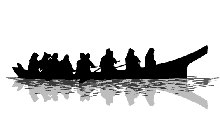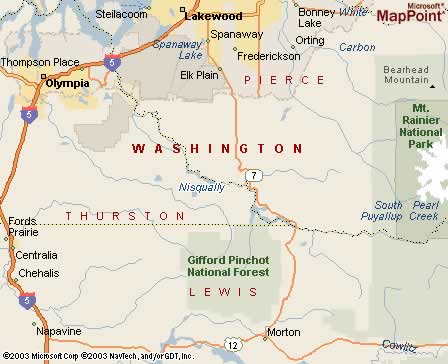 NISQUALLY,
Wash. - In 1978 the United States government passed the
Indian Religious Freedom Act. This policy recognized the
need to protect and preserve the inherent rights of American
Indians to believe, express, and act upon their traditional
ways of worshipping the Creator. NISQUALLY,
Wash. - In 1978 the United States government passed the
Indian Religious Freedom Act. This policy recognized the
need to protect and preserve the inherent rights of American
Indians to believe, express, and act upon their traditional
ways of worshipping the Creator.
This
policy change began to encourage American Indians to revive
their ancient cultures. The response of the Northwest Coastal
tribes was to bring back the canoe journeys.
In
1989 the Quileutes of La Push, Wash. actively challenged the
other coastal tribes to respond to the new law by organizing
a "Paddle" from their shores in La Push to Seattle
during the state centennial celebration. A few Canadian tribes
joined the journey that resulted in an invitation being issued
to Washington tribes to paddle to Bella Bella, Canada in 1993.
The
news spread fast through the moccasin telegraph and tribes
began to eagerly participate in the paddles. The Canoe Journey
occurs annually now. Drumming and singing are a large part
of the "Paddle." The songs are used to welcome the
canoes to shore, to give the people strength while they are
paddling, and to identify themselves to other tribes. There
are give-a-ways and pot latches all along the journey as the
canoe families pull into different villages on the way to
their destination.
WaHeLut
Indian School at Frank’s Landing in Washington chose
to become a part of the Canoe Journey. They obtained two cedar
logs to be carved into a 14-foot canoe.
Principal
Jon Claymore said, "I had a dream of WaHeLut having their
own canoe in the journey. We recently hired a carver from
Lummi and now we are seeing that dream materialize."
The
logs have to be blessed in ceremony before the actual carving
begins to ensure good spirits and safe journeys. Students,
parents, staff, and elders gathered around the cedar logs
on June 6 to accomplish this purpose.
Lummi
carver David Wilson said, "The logs are going to become
a part of the canoe journeys. We’re all a part of the
dream Jon had. We are blessing the cedar logs today and telling
them that we’re not taking their life, but that we are
giving them a new life. We are asking the Creator’s blessing
on them as we have taken the cedars from their home in the
forest."
The
sun shone hot as the ceremony opened with a blessing song
by the students and then a prayer. The cedar logs were circled
four times and then brushed with cedar boughs.
Wilson
continued, "Today is a hot day and it is a small sacrifice
to stand in this weather and bless these logs for transformation
into a Coastal Salish-style canoe."
Four
witnesses were chosen from the gathering to tell everyone
of the ceremony and given Pendletons as thanks. Nisqually
Elder Billy Frank, a well-known political figure in the halls
of Congress was asked to speak. He said, "The cedars
hold water in the land for it to grow in abundance. We used
the cedar bark for our clothes, the wood to heat our lodges,
and the canoes to travel on our highways, the rivers. They
have always been a part of our lives, our culture. We have
to educate others that live with us to tell them to protect
our trees and instruct them how to manage the forests better.
It is important that we stand in the hot sun today to witness
this ceremony."
The
canoe journeys are not races or competitions. The elders stress
that the people are uniting to foster their strength and regain
their cultures. Elder Frank said, "Remember we have to
paddle together. One doesn’t go to the left and one to
the right. We have to do it all together."
|


 NISQUALLY,
Wash. - In 1978 the United States government passed the
Indian Religious Freedom Act. This policy recognized the
need to protect and preserve the inherent rights of American
Indians to believe, express, and act upon their traditional
ways of worshipping the Creator.
NISQUALLY,
Wash. - In 1978 the United States government passed the
Indian Religious Freedom Act. This policy recognized the
need to protect and preserve the inherent rights of American
Indians to believe, express, and act upon their traditional
ways of worshipping the Creator. 